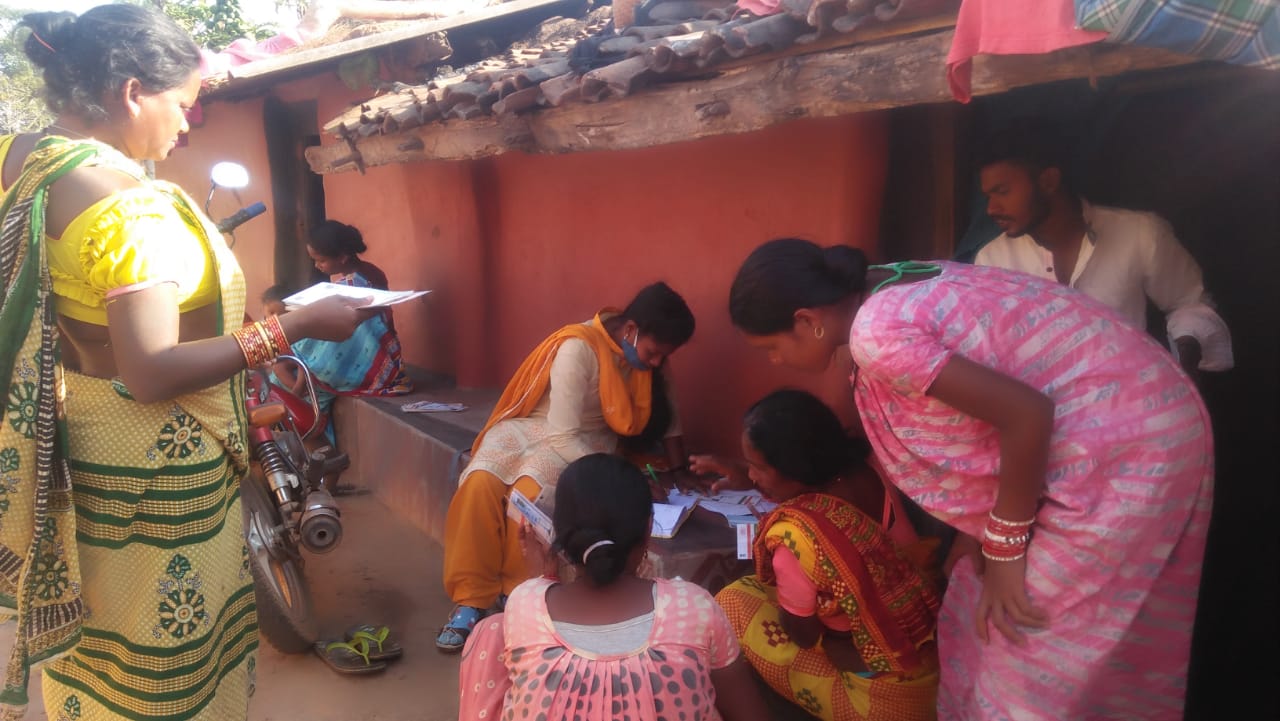Job cards help returnee migrants find work during COVID-19
StoryBy Chandrika Patnaik
23 August 2021
A COVID-19 response initiative creates awareness on social protection schemes and benefits people with job and food security across six districts in Odisha.

Community Mobiliser doing household level survey in Lanjigarh block of Kalahandi district.
Photograph by Indra Majhi
Jobs are hard to come by in the small village of Kankutru in Lanjigarh block of Odisha’s Kalahandi district. Of the 568 households, there are 255 Scheduled Tribe and 186 Scheduled Caste households. Out migration in search of work is common with most of the young men migrating to Kerala to find jobs in the hotel or construction industries. Women and the older men stay behind and go to work as daily wage labourers. This is keeping in trend with other blocks in the district, like Thuamul Rampur, where one member from at least one in five districts migrated for work as per a Gram Vikas and Centre for Migration and Inclusive Development study.
Sumati Majhi from Kankutru explains the situation, “People have very little in terms of cash here. Very few have land from which they can get incomes to support their families and live comfortably. Also, due to lack of employment opportunities, most of the youth prefer to go to faraway Kerala from where they remit money to their families back home.”
The COVID-19 pandemic lockdown, from 25 March 2020, triggered mass reverse migration back to the village. Kerala, their major destination, was one of the first places to be impacted by COVID-19, throwing them out of their jobs much before the lockdown. The localised lockdowns in different parts of the country due to the continuing spread of the COVID-19 virus, and lack of travel options mean that migrant workers wanting to go back to work places were unable to do so.
“It’s been really tough since the lockdown and especially since my husband came back from Kerala. I have managed to make leaflets and sell them through the lockdown period, when our community members had arranged a small pick up vehicle which took our plates to sell outside. I managed to earn ₹1700 every month and with that amount we made ends meet with great difficulty,” says Kamli thinking about the harrowing months last year.
The Government of Odisha allowed resumption of NREGA works in early May 2020. With the income and livelihood insecurities even for those who depended on work in their local economies – farmers, masons, daily wage labourers – being severe, proper and full utilisation of jobs under NREGA became crucial. However, many of the poor eligible households were excluded from receiving the support under the scheme due to not having the job cards because of various reasons from insufficient documentation for application to procedural complexities.
On 29 September 2020, Gram Vikas began the initiative, ‘Response to COVID-19 and Migration’ in selected 18 blocks in six districts of Odisha to create awareness and provide access to social protection schemes with 38 Community Mobilisers and 263 Village Volunteers. The process started with direct interaction with the community through a household survey.
Sumati Majhi, one of the Community Mobilisers for the Lanjigarh block remembers, “When I met these households during the survey, most of the women told me how difficult it has been since the lockdown to support their families, as most of the men are back in the village from Kerala and there are no ways to earn in the village. We applied for job cards for 12 households in the village, and all the 12 have got their cards now.”
Other cardholders like Nurta Majhi and Ramesh Majhi echo Kamli’s sentiments, “My family has been struggling since I came back from Kerala. My wife, Nita Majhi and myself can survive on plain rice and salt. But it is difficult to feed the same to my two daughters who are very small. There aren’t too many livelihood options here. If I had some land, I would have grown some vegetables for my family. This is why getting this card was very important. We are eligible for government work now.”
Scarred by his experience from the lockdown days, Ramesh Majhi has decided not to migrate out of the state for work, “I have been lucky to receive this card. Earlier, we had made similar requests to our Sarpanch many times but nothing happened. We had to look for jobs outside the state and stay so far away from our families. I have three small children. I have decided to stay back and take up NREGA work as my wife and I are eligible and can enroll to find work under it now.”
Overall, Gram Vikas’ intervention supported by UNDP helped 21,914 eligible beneficiaries to get access to at least one State or Central scheme. Additionally, the effort reached 80,403 households with information on social protection schemes and preventive health measures against COVID-19.
MGNREGS work provides livelihood opportunities to rural poor during the lockdown.
Photograph by Radhika Pradhan
ACKNOWLEDGEMENT
Sumati Majhi did the field reporting for this story. Priya Pillai edited the story.
ABOUT THE AUTHOR
Chandrika Patnaik is with the Communications Team at Gram Vikas and leads on content production.
RELATED BLOGPOSTS
Turning losses into gains: How Mallipanka farmers find success in new crops
Reviving agriculture: Mallipanka’s first strawberry farm story.
Ensuring dignity beyond life: supporting migrant families in their darkest hours
Gram Vikas ensures safe migration and dignified repatriation for deceased migrant workers, supporting bereaved families.
Collective leadership transforms ageing overhead water tank to secure household water supply for all
Kalakhadi’s aging overhead tank revived through collective leadership, ensuring sustainable water supply for the community.